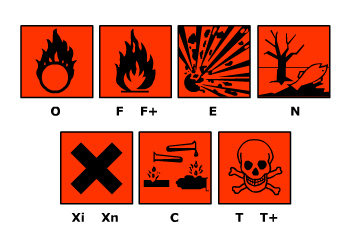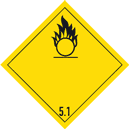Hazard symbols
From PyroGuide
Everyone who stores dangerous substances is required BY LAW to properly classify, pack and label them
for their own safety and for the safety of others ! A LABEL MUST CONTAIN: 1. the name of the substance; 2. its associated Hazard Symbols (described and explained here below); 3. its associated R- and S-phrases.
Council Directive 67/548/EEC of 27 June 1967 on the approximation of laws, regulations and administrative provisions relating to the classification, packaging and labelling of dangerous substances (as amended) is the main European Union law concerning chemical safety. Under this Directive, there are various hazard symbols used for labelling chemicals. One should take the time to correctly label his/her chemicals in stock. This is compulsory in some states and regulated by law.
Xn Harmful, Nocif
Xi Irritant
O Oxidizing
C Corrosive
N Harmful to the environment
T Toxic
T+ Highly toxic
F Highly flammable
F+ Extremely flammable
E Explosive
Carc. Carcinogens
Mut. Mutagens
Repr. Toxic for reproduction
These are the most common symbols which can be found when buying chemicals. Protective equipment (dust mask, gloves, inhalator...) should be worn when using hazardous chemicals, especially when using toxic ones such as minium or paris green. Some chemicals are listed as T+ when they are potentially carcinogen, while years ago they were listed as Xi only.
It is very adviceable to split your chemicals after labelling and put them in different containers. In this manner one will never store (unmixed) oxidizers and fuels in the same box. While the risk of accidential ignition would not be very high in such a case, the chemicals in course of time are contaminated with dust particles of each other, and of course there is a significally smaller risk in case of fire. Try to separately store oxidizers and fuels in any case.
More hazard symbols (one can label the overall boxes with)
5.1 Oxidizer
1.1 Potentially mass explosive reagent such as corned BP
1.3 Display fireworks such as large shells
1.4 Toy fireworks and small shells
4.1 Flammable solids such as metal powders
6.1 Toxic chemicals


